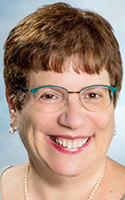By Deborah Jeanne Sergeant

Individualized care is important at any age; however, medical researchers tend to lump together people in their 70s, 80s and 90-plus. A few legitimate factors make it more difficult to study people over age 70. Many older adults take medication for multiple health conditions which makes it hard to include them in a study. People who go to live in a nursing home may be difficult to interview subsequently because of access. A sizeable number of participants in a study of people over age 70 may die from unrelated conditions before the study concludes.
Some experts suspect that researchers who focus on younger people do so because they believe their time is better spent on people with a potentially longer lifespan.
“Ageism, unfortunately, still exists in every segment of society,” said Mary Rose McBride, vice president marketing and communications for Lifespan in Rochester.
Unlike in research, when it comes to providing medical care, age is only a number.
“It’s crucial that medical professionals interact with the person, not their age,” McBride said.
There’s a huge difference between someone who’s 70 and active and healthy and someone who’s a frail 90-year-old who needs more assistance. But on the other hand, treating the person regardless of age represents good care.
McBride said she recently accompanied her 89-year-old father to a doctor’s appointment. He had lost a significant amount of weight in the last year, and the family felt concerned.
“When I noted his age, the doctor’s response was, ‘It doesn’t matter if he’s 89, that shouldn’t happen.’” I was thrilled to hear her treat my dad, not his age,” McBride said. “It shouldn’t matter if someone is 70 or 90.”
Unfortunately, McBride’s good experience may be exceptional.
Marsha Raines, licensed master social worker and founder and president of Marsha Raines and Associates in Rochester, aids clients with elder care consulting and care management and long-term care insurance. She said that in general, “our society and community really devalues older people.”
She added that negative stereotyping of older people as out of touch and unable to learn becomes self-fulfilling for older people because of how they are treated.
“Many of our medical professionals have internalized this message that devalues older people,” Raines said. “We need to look at their functional ability, not age.”
Though most people have two to three chronic medical conditions requiring medication by the time they’re 75, that’s not the case for all older adults. And many people younger than 75 have as many or more health conditions.
Raines recommends older adults to seek care from a geriatrician, since this medical specialty provides care with a more holistic approach.
“Their philosophy isn’t just to treat the specific condition or illness but to look at the whole picture,” Raines said. “With a geriatrician as a member of the care team, generally the outcome for the elder is much greater because we take a look at the older adult’s nutrition, family support, activities, and informal supports such as how they get to appointments and grocery stores and follow-up exams.”
Raines also encourages older adults to be more proactive in their health care. They need to follow their care providers’ advice regarding medication, diet and exercise.
Just as with people of any age, older adults need to make a list of their medication and any questions they have for their care providers before the visit. Otherwise, the provider may not think to ask the question or may run out of time to address their needs.
“A lot of older people are reluctant to bring concerns to their doctors because of society feeling that when you’re older, it’s inevitable you’ll be in pain,” Raines said. “I’m hoping that people feel they need to develop a mutually respectful relationship where the elder feels free to discuss their concerns and the physician will treat the elder without ageism.”
Bringing along a trusted friend or relative can also help in asking sufficient questions and in recording the conversation.
“We’re hopefully moving towards a place where number age isn’t as important as where we are,” Raines said. “What we really need is more geriatricians in our community. Geriatricians receive the training to really understand common issues facing older adults.”
